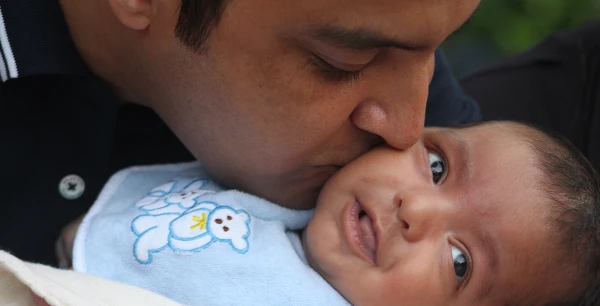What Is the 5-Month Sleep Regression?
The 5-month sleep regression is a period of increased night wakings, short naps, and difficulty falling asleep. It’s caused by:
- Developmental leaps – Your baby is learning new skills like rolling, reaching, and babbling, which can disrupt sleep.
- Changes in sleep cycles – Their sleep is becoming more structured, leading to lighter sleep and more wakings.
- Increased awareness – Babies at this age are more distracted, making it harder to settle at bedtime and naptime.
- Not every baby experiences a full regression, but if sleep suddenly changes around this time, this could be why.

Signs & Symptoms of the 5-Month Sleep Regression
If your baby’s sleep has suddenly changed, here are the most common signs:
Nighttime Sleep Struggles
- 5-month-old suddenly not sleeping – More frequent night wakings.
- Falling asleep takes longer – Your baby may need more help settling.
- Restless sleep – Tossing, turning, and waking between cycles.
Napping Issues
- Shorter naps – Your baby may take 20-30 minute naps instead of 1-2 hours.
- Fighting naps – Increased nap resistance (even when overtired).
- Inconsistent nap times – One day they nap well, the next day they refuse.
Tip: At this age, wake windows should be 2-2.5 hours before naps.
Common Sleep Issues at 5 Months
Not Sleeping Through the Night
It’s normal for babies to still wake at night, but if your 5-month-old was sleeping longer stretches and suddenly isn’t, it could be due to:
- Developmental changes – They are learning new skills and waking more.
- Increased hunger – A growth spurt may cause more night feedings.
- Sleep associations – If they need rocking, nursing, or holding to sleep, they may struggle to settle without it.
? Tip: If your baby is waking every 2 hours, check if they are relying on sleep props (rocking, feeding) to fall back asleep.
Frequent Night Wakings & Restless Sleep
- If your baby is restless at night, it may be due to: ✔ Practicing new skills (rolling, kicking, babbling). ✔ Discomfort from teething or digestion issues. ✔ Overtiredness from missed naps.
Tip: Give your baby plenty of floor time during the day to practice rolling and movement, so they don’t feel the need to do it at night.
How Long Does the 5-Month Sleep Regression Last?
Most sleep regressions last 2-6 weeks, depending on how quickly your baby adapts. If sleep struggles last longer, check for:
- Overtiredness – If naps are too short, night sleep will be affected.
- Sleep habits – If your baby is rocked or fed to sleep, they may struggle to link sleep cycles.
- External disruptions – Travel, illness, teething, or growth spurts can extend the regression.
How to Help Your Baby Through the 5-Month Sleep Regression
1. Follow Wake Windows & Sleep Cues
- Keep wake windows 2-2.5 hours before naps.
- Watch for yawning, rubbing eyes, and fussiness as sleep cues.
2. Create a Consistent Bedtime Routine
-
- A calm, predictable routine signals that it’s time for sleep.
- Keep bedtime between 7:00 – 8:00 PM.
- Use dim lights, white noise, and a soothing activity (book, cuddle, lullaby).
- Make a 5 month sleep schedule.
3. Encourage Self-Soothing (When Ready)
- At 5 months, babies can start learning to fall asleep independently.
- If they rely on rocking or feeding to sleep, try reducing help gradually.
Tip: Try the Sleep Lady Shuffle—stay near your baby while they fall asleep, offering gentle reassurance without creating new sleep habits.
4. Keep Night Wakings Low-Stimulation
- Avoid bright lights and active play.
- Keep interactions calm and brief.
- If feeding, make sure baby is actually hungry, not just waking out of habit.
5. Be Patient & Stay Consistent
- Sleep regressions pass, but consistency helps shorten them.
- If sleep training, stick with a method for at least a week before making changes.
FAQs
Is There Really a 5-Month Sleep Regression?
Yes! While not as well-known as the 4-month regression, many babies experience a sleep disruption at this age due to developmental changes and shifting sleep patterns.
How Long Does the 5-Month Sleep Regression Last?
Typically 2-6 weeks, but consistency is key to helping your baby through it.
How Can I Get My Baby to Sleep During a Regression?
- Keep wake windows appropriate (2-2.5 hours).
- Offer extra daytime feeds if hunger is causing more wake-ups.
- Stick with a predictable bedtime routine.
- Provide gentle sleep support (but avoid creating new sleep habits).
Final Thoughts
The 5-month sleep regression is a sign that your baby is growing and learning new skills! While sleep might feel unpredictable for a few weeks, staying consistent and using gentle sleep strategies will help your baby get back on track.
Hang in there—you’ve got this! ?




